About Dental Implants
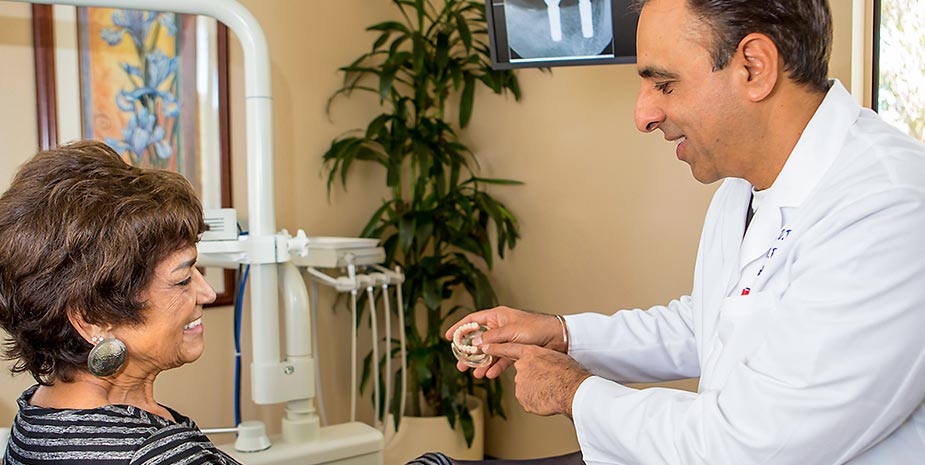
Dr. Setya is an expert in placing dental implants to replace missing teeth.
The Lifelike, Modern Solution for Missing Teeth
Dental Implants are the modern gold standard of tooth replacement. Dr. Setya always recommends dental implants for people who are candidates for them, as dental implants are the strongest, longest lasting, most comfortable and most lifelike replacement option for missing teeth.

What is a dental implant?
A dental implant is an artificial tooth root made of strong and biocompatible materials, including titanium and tooth-colored dental ceramic. It is placed in the jawbone, and a crown, dental bridge or denture is attached. Implants look, act and feel like natural teeth—people usually do not notice any difference. They allow people to talk, chew and exert pressure, just like with natural teeth.
A strong foundation
The bone into which the implant is placed actually grows around the implant and fuses to the implant surfaces. This stably anchors the implant and makes it as strong or stronger than a regular tooth root.

Benefits of Dental Implants
Dental implants function most like natural teeth of all tooth replacement options. The dental crowns, bridges or dentures anchored on the implants also look and function most like natural teeth, giving dental implants many distinct advantages. With implants:
- You can talk, chew and exert pressure on your teeth just like natural teeth.
- You have the same chewing and biting power as with natural teeth. The chewing and biting pressure is adequate to maintain the bone volume around the implant and around the adjacent teeth, keeping the implant and the adjacent teeth stable.
- The chewing and biting pressure from the implant tooth also preserves the size and shape of the jaw bone supporting your teeth and prevents the jaw from shrinking and collapsing your face shape.
- You can comfortably bite and chew the foods necessary for full nutrition and do not have to resort to the blender.
- There is no grinding down and compromising the strength of adjacent teeth needed to replace a missing tooth, as with a dental bridge.
- The gap in the gum line left by the missing tooth is filled. This prevents additional bacteria from accumulating on the adjacent teeth and inhibits gum disease.
Candidates for Dental Implants
Because of major advances in technology, most people can now successfully get dental implants. In the past, people with too much bone loss around missing teeth did not have the necessary foundation for the implant to be securely anchored. Dr. Setya uses advanced bone grafting procedures to replace the lost bone and provide the support for implants to be placed successfully.
People can now receive implants even if they have health conditions that formerly made successful implant placement too risky. This includes such things as diabetes, heart disease and heavy smoking. Dr. Setya can work directly with your physician if necessary to ensure these factors do not adversely affect success.
There are no age limits on who can receive dental implants. The only exception is young people whose jaws have not developed fully.
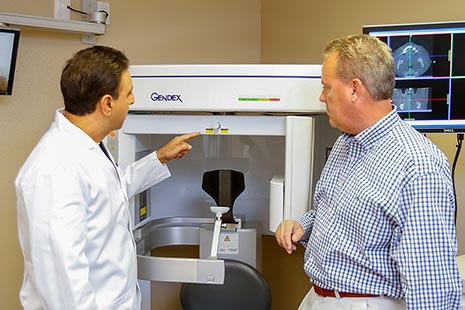
We use high-tech 3D images from our Cone Beam 3D CT scanner to precisely plan your implant treatment.
Minimally invasive dental implant placement
Major technical advances over the last several years allows Dr. Setya to place dental implants efficiently and accurately with little or no cutting or suturing and with minimal to no post-operative discomfort.
As a part of planning the implant placement, Dr. Setya takes a 3D 360° series of images of your entire jaw, teeth and tooth-supporting bone with our cone beam 3D CT scanner. Using these images in special software, he plans the exact point of placement for the implant and plans any bone grafting that is needed to ensure the implant will be anchored securely.
The problems with dentures as replacement teeth
The jaw bone supporting your teeth needs chewing and biting pressure to maintain its volume and density. When that pressure is lost because of missing teeth, the jaw bone under the missing teeth starts to dissolve away and the bony ridge that used to hold the teeth sinks. When you have no teeth on the ridge, the entire ridge loses thickness and height and the lower third of your face eventually collapses.
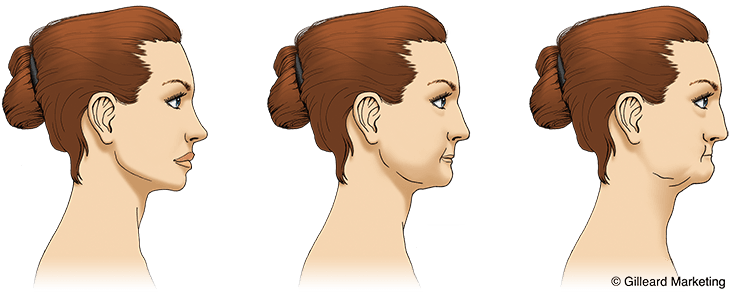
Dentures cause bone loss in your jaw which causes the lower third of your face to eventually collapse
The disadvantages of dentures
- Dentures do not provide the biting and chewing pressure necessary to keep your jawbone from shrinking. In fact, the type of pressure exerted by dentures actually accelerates bone loss and facial collapse.
- Dentures often need to be secured in the mouth with adhesives.
- Dentures slip and need to be continually refit due to the shrinkage of the jaw bone.
- Dentures cover the roof your mouth and block your sense of taste.
- Dentures can click or make noise when you are eating or talking.
- Dentures have only 10% of the biting and chewing power of natural teeth. This makes it hard or impossible to chew many foods that are needed for good health and makes it necessary to use a blender for those foods if you eat them at all.
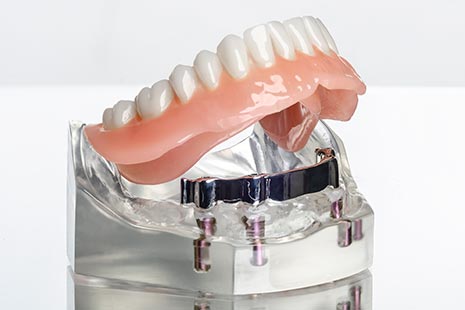
Implant-supported dentures have greater chewing power
When dental implants are used to support a denture, the biting and chewing power of the denture is increased because the denture rests solidly on the implants. Further, the biting and chewing pressure on the implants stimulates the underlying bone and prevents bone loss.
New Patient Special Offer
Exam, X-Rays, CT Scan (as needed) and Consultation
DONATE $89 TO CHARITY
and receive your exam and x-rays at no additional charge.
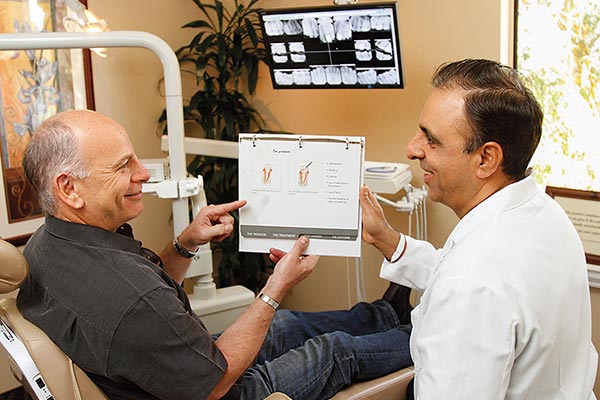
Receive a thorough examination and friendly, informative consultation. Your appointment will include the following:
- Comprehensive oral examination
- Digital X-rays
- CT Scan (if needed)
- Written treatment plan
